12 critical areas
![]()
Click on each of the icons above for more
The 1995 Beijing Platform for Action flagged 12 key areas where urgent action was needed to ensure greater equality and opportunities for women and men, girls and boys. It also laid out concrete ways for countries to bring about change. UN Women works with governments and partners to ensure such change is real for women and girls around the world.
Take a look at some of the efforts on each of the 12 Beijing critical areas of concern:
Women and poverty
When women are poor, their rights are not protected and they face double discrimination, on account of their gender and economic situation. Women, their families, communities and economies suffer as a result.
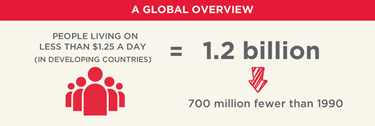
UN Women runs myriad programmes to provide training, loans and practical skills to empower women economically, give them a voice, strengthen social services and increase awareness of women’s rights.
Here are a few examples:
Changing the landscape with all-women worksites in India
UN Women interventions have reached more than 100,000 poor and marginalized women across India. As the result of a Fund for Gender Equality project, more than 30,000 marginalized rural women now manage worksites and are able to ensure wages are paid and demand their rights.
“I bought a mattress and health insurance” – rural farmer
Through Farmer Field Schools, more than 350 Rwandan farmers have undergone a six-month course to learn about nutrition, modern agricultural techniques and business skills while creating cooperatives and pooling savings.
Read our Beijing+20 In Focus package on Women and poverty.
What the Beijing Declaration says about Women and poverty.
Education and training of women
Education is essential for women to reach gender equality and become leaders of change. While women and girls today are far more educated than ever before, gaps remain. Educated women benefit entire societies, contributing to flourishing economies and the improved health, nutrition and education of their families. Education and training are also tools to help change harmful gender stereotypes.
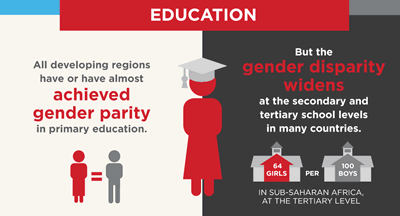
UN Women promotes women’s right to an education in all fields. We support educational programmes to promote gender equality and women’s rights, revise formal school curricula and policies, and help train teachers, students and parents.
"Voices against Violence" curriculum mobilizes youth
In Pune, western India, more than 50 national trainers and youth leaders from the girl guiding movement across the Asia-Pacific region gathered for the first regional “Training of Trainers Workshop” on delivering a unique non-formal education curriculum that will teach young people how to stop violence against girls and women.
Closing the sci & tech gender gap in the Dominican Republic
Overcoming stereotypes, promoting interest in STEM among girls, and eventually reducing the gender digital divide in the Dominican Republic is the objective of the project Gender and Information and Communication Technologies: Equality and Equity in E-Dominican, supported by UN Women’s Fund for Gender Equality.
Read our Beijing+20 In Focus package on The Education and training of women.
What the Beijing Declaration says about Education and training of women.
Women and health
Women need to be healthy in order to realize their full potential. This includes proper nutrition, sexual and reproductive rights, and mental health, as well as freedom from violence.
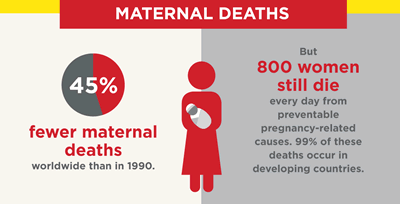
UN Women advocates for States to better coordinate the provision of health services for women and girls –including for survivors of violence– and supports non-governmental partners providing essential services. We work to end practices that bring danger to women and girls, including child marriage, female genital cutting, dietary restrictions, and others. We act to ensure that women’s needs are met during medical humanitarian crises, and support and empower women living with HIV and AIDS.
UN Women action to confront the Ebola crisis
UN Women is facilitating mobilization and sensitization and coordinating UN efforts to address gender in the response to the Ebola crisis. From working with local radio stations and traditional leaders to raise awareness and aid prevention, to producing educational materials to train health workers, our efforts and programmes are focused primarily in Liberia and Sierra Leone.
Women living with HIV/AIDS start afresh in Cambodia’s villages
Through the Fund for Gender Equality, more than 1,300 poor women living with HIV/AIDS have received health counselling and home-based care, as well as livelihood skills-training and grants to start their own businesses. Their families have better nutrition and food security as a result. Through self-help groups, they’ve also increased knowledge of their rights.
We will publish an in-depth Beijing+20 In Focus package on Women and Health in April 2015.
What the Beijing Declaration says about Women and health.
Violence against women
Violence hurts women and girls and hampers their ability to thrive in multiple ways. Since the Beijing Conference, an historic two-thirds of countries have put laws on the books to stop domestic violence. Yet gaps in laws, implementation of legal protection and lack of access to essential services remain for women globally.
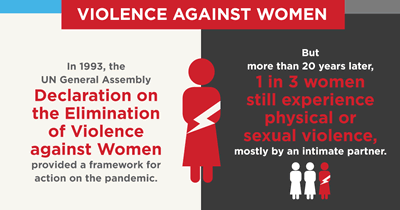
Ending violence against women is one of UN Women’s key priorities. We support expanding access to quality multi-sectorial responses for survivors covering safety, shelter, health, justice and other essential services. We advocate for laws and help guide policies and action plans to help step-up investments in prevention—the most cost-effective, long-term means to stop violence against women by addressing its root causes.
New law spurs action, bringing protection to many
With support from UN Women, The Former Yugoslav Republic of Macedonia adopted a new law against domestic violence in August 2014, which expanded the definition of violence against women and introduced training on gender equality in the formal education system and for civil society service providers.
Games and children, a new direction to ending sexual violence
In Cairo, a pilot project uses games and music to teach children to say no to violence. This initiative is part of the city’s comprehensive Safe City Programme which began in 2011 to prevent and respond to sexual violence in urban spaces, supported by UN Women and local partners.
Read our Beijing+20 In Focus package on violence against women and UN Women compilation.
What the Beijing Declaration says about Violence against women.
Women and armed conflict
Wars and armed conflict destroy families and societies and leave women and girls particularly vulnerable. Sexual violence is widespread and often used as a war tactic.

UN Women’s programmes on women, peace and security engage women in all aspects of negotiations, peacebuilding and reconstruction to build inclusive societies. We train peacekeepers to detect, address and stop conflict-related sexual violence, while also supporting the reform of justice and security institutions and ensuring that public services that are fully responsive to women’s needs.
Nobel Peace women visit Colombia to discuss sexual violence
Women Nobel Peace Prize winners Shirin Ebadi and Jody Williams visited Colombian women survivors of sexual violence in a conflict that has lasted more than 50 years. They also met with President Juan Manuel Santos to ask for increased attention to these crimes throughout the peace process now underway in Havana.
“I was forced to become one of his 27 'wives'”
At age 12, Evelyn Amony was abducted by the Ugandan rebel group known as the Lord’s Resistance Army, which for 30 years has committed numerous atrocities. Today, she chairs a women’s advocacy network of war-affected Ugandan women. With funding from UN Women, it encouraged the Ugandan Parliament to adopt a landmark resolution addressing war-affected women.
Read our UN Women In Focus package on Women, Peace and Security.
What the Beijing Declaration says about Women and armed conflict.
Look out out for our Beijing+20 In Focus package on Women and armed conflict, coming in June 2015.
Women and the economy
Whether in businesses, on farms, as entrepreneurs or employees, or through unpaid domestic or care work at home, women make enormous contributions to economies. Gender discrimination means women often end up in insecure, low-wage jobs, and constitute a small minority of those in senior positions.
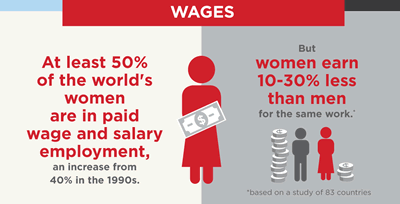
To ensure that women can contribute fully and benefit from the economy, UN Women runs multiple programmes for women’s economic empowerment. We promote women’s ability to secure decent jobs, own land, accumulate assets, and influence institutions and public policies determining growth and development. We also work with partners to ensure that workplaces are free of violence and sexual harassment.
With sewing and sowing, self-reliance blooms in Central Asia
Thanks to a regional programme, families of migrant labourers in Kyrgyzstan and Tajikistan are receiving training, resources and micro-credit loans to become self-reliant entrepreneurs. More than 520,000 migrant workers and their families have benefitted from a wide range of services. The programme also promotes policy development and dialogue on migration.
Women plant seeds of hope at the Dadaab refugee camp
A livelihood project implemented with the support of UN Women is helping prevent gender-based violence in the world’s largest refugee camp. Vulnerable women are being trained in business management and income-generating agriculture, so they won’t have to walk far distances to fetch food or supplies.
Read our Beijing+20 In Focus package on Women and the economy.
What the Beijing Declaration says about Women and the economy.
Women in power and decision-making
Once in leadership roles, women make a difference. But they are under-represented as voters and in top positions, whether in elected office, the civil service, corporate boardrooms or academia.
UN Women advocates for reforms to ensure women’s fair access to decision-making. Our programmes on leadership and participation provide training for women political candidates to help build their skills, as well as voter and civic education and sensitization campaigns on gender equality. We work with UN country teams, unions and civil society to ensure that elections uphold women’s rights, including to vote and campaign free from violence. Through the Fund for Gender Equality, we also support women’s grass-roots groups and help give women a greater voice on a range of issues.
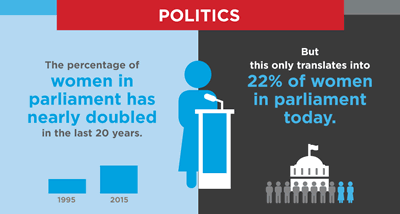
Strengthening Voices for Democracy
From Azerbaijan to Zimbabwe, UN Women is active in more than 70 countries around the world. From lobbying for constitutional changes or quota laws, to voter education and identification programmes, we work to strengthen women's voices, leadership and political participation.
Tunisia’s new Constitution: a breakthrough for women’s rights
Following the revolution and months of protests, Tunisia’s Constituent Assembly adopted a new Constitution in January 2014, considered a harbinger of change for gender equality in the Arab States. It is the result of many months of sustained advocacy led by civil society groups, with the support of UN Women.
Read our Beijing+20 In Focus package on Women in power and decision-making.
What the Beijing Declaration says about Women and power and decision-making.
Institutional mechanisms
Specialized institutions have played an important part in informing laws, policies and programmes and advancing gender equality. Robust laws and policies coupled with stronger mechanisms to coordinate various actors and ensure their effective enforcement and implementation can push the agenda.
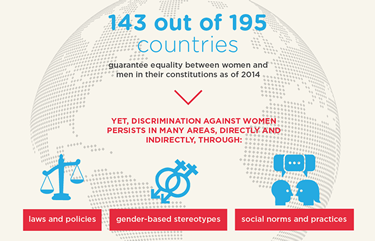
UN Women works with governments to develop informed national action plans, ensure gender-responsive budgeting, and strengthen coordination among diverse actors for sustained and meaningful action. We partner with governments, UN agencies, civil society organizations and other institutions to build capacity and increase awareness. We support and advocate for evidence-based policymaking. To this end, UN Women stresses the need for sex-disaggregated data and played an important role in the development of 52 gender indicators.
Cambodia confronts gender violence with multi-pronged plan
UN Women supported the formulation of Cambodia’s 2nd National Action Plan to Prevent and Respond to Violence against Women through a participatory process informed by research and the voices of survivors. A multi-sectorial technical working group will now guide its implementation.
Budgets respond to the needs of women in Morocco
The needs of women and girls are increasingly being reflected in how governments spend in Morocco and a new organic law of finance passed in January 2014 by the Council of Government has cemented gender throughout the budgeting process.
What the Beijing Declaration says about Institutional mechanisms for the advancement of women.
Human rights of women
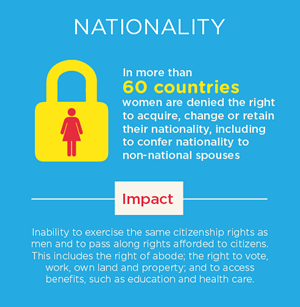
Women and girls are entitled to the full and equal enjoyment of all of their human rights. The Beijing Platform for Action confirms that protection and promotion of human rights is the first responsibility of governments and core to the work of the United Nations.
UN Women provides technical assistance to ensure that States create national laws, policies and plans to ensure women’s rights and protect them against violations. We promote international treaties, such as the Convention on the Elimination of All Forms of Discrimination against Women (CEDAW), lobby decision-makers to ensure that adequate laws are passed and work with partners to train and educate the law enforcement and justice officials who must implement them.
Specialized prosecutors enhance survivors’ access to justice
UN Women is training a pool of 15 specialized public prosecutors to handle domestic and gender-based violence cases in Palestine. We are also supporting the development of Standard Operating Procedures and helping improve coordination with service providers to ensure access to justice for survivors of violence.
Ending impunity for femicide across Latin America
UN Women and the UN Human Rights Office have developed a Model Protocol to guide investigations of gender-based murders. Several Latin American countries are working to implement the Protocol, which seeks is to improve treatment of victims and end impunity for the tens of thousands of women and girls murdered each year.
Read our Beijing+20 In Focus package on the Human rights of women.
What the Beijing Declaration says about Human rights of women.
Women and the media
The media plays a significant role in perpetuating and challenging social norms that condone discrimination or violence against women. It can objectify women but also showcase strong women leaders and protagonists who can become role models for their audience.
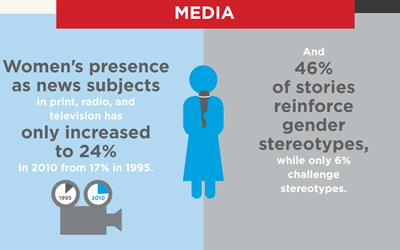
UN Women collaborates closely with the media as a key ally in advancing women’s rights. Apart from working with the media to facilitate in-depth coverage on women’s rights, we undertake research on the portrayal of women in news media as well as the entertainment industry. Additionally the Media Compact on Beijing+20, works to increase and sharpen the profile of women in the news. We also conduct special workshops and trainings with journalists globally to encourage gender-sensitive reporting.
Adjusting the frequency: Women on the airwaves
UN Women and the World Association of Community Radio Broadcasters are raising awareness of critical issues through a series of co-productions for the Beijing+20 anniversary. They offer a comparative perspective between 1995 and 2015 from places around the world.
Stories of survivors portrayed by journalists in Georgia
Through workshops organized by UN Women, Georgian journalists are being trained on gender-sensitive reporting and how to cover violence against women in the media. Journalists then wrote or produced survivors’ stories on domestic violence that were part of an interactive exhibit and theatrical performance.
Stay tuned! We will publish an in-depth Beijing+20 In Focus package on Women and media in May 2015.
What the Beijing Declaration says about Women and the media.
Women and the environment
Women are among the most affected by climate change. They are often the ones gathering water, fishing or farming land affected by flooding. Meanwhile, their voices are often ignored in environmental planning and management. They also have less access to land and productive resources.
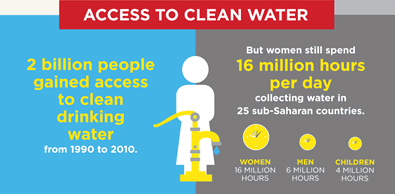
UN Women seeks to ensure women are involved in environmental decision-making at all levels, integrating their concerns in policies and programmes, and establishing ways to assess the impact of development and environmental policies on women. We take part in international fora, following negotiations and maintaining active outreach to ensure that the decisions incorporate references to gender equality, women’s rights and women’s contribution in climate change mitigation and adaptation.
Women at the forefront of disaster response in the Pacific
Whether training women solar engineers in Fiji or assisting with the humanitarian response plan after a major cyclone in Tonga, UN Women is working with climate-change and disaster-management professionals across the Pacific.
Caribbean women protect crops through green technologies
Through workshops on more sustainable farming techniques, women farmers in Barbados, Grenada and Jamaica are finding a more stable and reliable way of making a living. They learn about water conservation, rain-water harvesting and the importance of protecting the environment to secure their livelihood.
Read our Beijing+20 In Focus package on Women and the environment.
What the Beijing Declaration says about Women and the environment.
The girl child
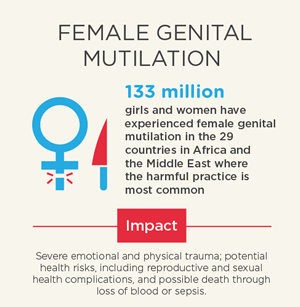
Specific forms of violence and harmful practices, including female genital mutilation (FGM) and cutting, breast ironing and child marriage, affect girls in particular, including child sexual abuse.
UN Women works to empower girls and young women to pursue their dreams, confront discrimination, and prevent violence of all kinds. We raise awareness of girls’ rights, support programmes that work with educators, parents and fathers in particular, and with religious leaders. To advance girls' education, health and well-being, we advocate with governments and other partners, striving for a world where girls can live free from fear, violence and discrimination.
China’s ‘left-behind girls’ learn self-protection
With China’s rapid economic growth, many parents are migrating to cities, leaving “left-behind girls” vulnerable to sexual violence. Through a UN Trust Fund to End Violence against Women programme, UN Women has helped train 500 teachers, 5,000 students and 2,200 guardians to prevent child sexual abuse.
Escaping the scourge of female genital mutilation in Tanzania
At a Maasai girls' school in Tanzania, girls at risk of experiencing female genital mutilation and early marriage are getting a chance to complete their education, thanks to a partnership with UN Women. The girls receive scholarships with full board to ensure they complete a minimum level of education.
Read our Beijing+20 In Focus package on The girl child.























